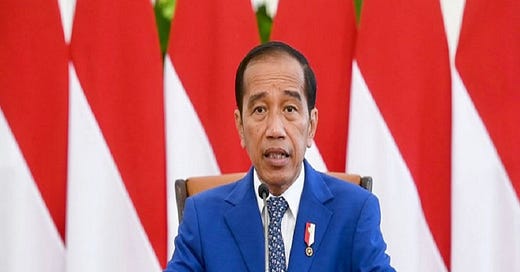Interpreting Indonesia’s Mediation In The Ukrainian Conflict
Indonesia has enormous strategic potential in the New Cold War and especially within the new Non-Aligned Movement (Neo-NAM) that its Indian partner hopes to assemble, which is why it would have been contrary to its objective national interests to comply with Western demands to choose Kiev’s side in the Ukrainian Conflict.
Indonesian President Joko Widodo, widely known as Jokowi, is traveling to Ukraine for talks with Zelensky before leaving for Russia to do the same with President Putin after attending this year’s G7 Summit as its guest. His mediation attempt is unlikely to succeed since not even Turkey, which has much closer ties with both conflicting parties, has been able to achieve much of anything yet despite months of trying its hardest. Nevertheless, it’s still a welcome gesture for Jokowi to visit both of them seeing as those leaders have been invited to attend the G20 Summit that he's hosting in Bali this November.
Russia is a member of this major economic group so it was a given that its leader would be invited, especially since Indonesia is practicing an admittedly imperfect policy of principled neutrality towards the Ukrainian Conflict. The country voted at the UN to condemn Russia’s ongoing special military operation in Ukraine earlier this yet but then abstained from the vote over removing it from the Human Rights Council. Despite these mixed signals, Indonesia hasn’t joined the US-led West’s Golden Billion in sanctioning that Eurasian Great Power, which is what matters most from Moscow’s perspective.
This pragmatic stance is in spite of ditching a prior Russian jet deal last December in favor of American and French warplanes. Taken together, this string of developments – abandoning the aforementioned deal, voting against Russia once but then abstaining the second time, refusing to sanction Moscow, and then meeting with Zelensky and President Putin ahead of their participation in this November’s G20 that it’s hosting – shows that Indonesia is putting its national interests first as it understands them to be and is eschewing so-called “bloc politics” in the New Cold War.
There are several reasons why it’s doing this. First, Indonesia was a founding member of the original Non-Aligned Movement (NAM), whose spirit is becoming all the more urgent to revive as the world once again bifurcates. Second, not inviting President Putin despite Western pressure to this end would have contradicted the country’s non-aligned foreign policy. Third, this in turn would have complicated its relations with China and India, the first of whom it’s pragmatically cooperating with yet also somewhat keeping at a distance while the second hopes to create a new Non-Aligned Movement (Neo-NAM).
Indonesia is large, strong, populous, and geostrategically positioned enough to play a leading role in this framework which aspires to jointly maximize its members’ strategic autonomy vis-à-vis the American and Chinese superpowers in what Indian thinker Sanjaya Baru describes as the bi-multipolar intermediary phase of the global systemic transition to multipolarity. It’s therefore of the utmost importance that it doesn’t sacrifice its general neutrality in the New Cold War by complying with the Golden Billion’s demands to sanction Russia and keep President Putin out of this year’s G20 Summit.
The optics of mediating in the Ukrainian Conflict are also expected to help to this end in terms of cultivating this image even though they almost certainly won’t result in a breakthrough as was earlier explained. Nevertheless, it’s pretty much for the sake of going through these neutral motions that Jokowi is taking the time to travel to those two countries to talk to their leaders about the special operation. There’s also the added benefit that Indonesia is the world’s largest Muslim country, which its leader can leverage to further improve his state’s soft power in that part of the world.
Altogether, Jokowi should be commended for his mediation efforts, and especially for holding firm and refusing to sanction Russia or keep President Putin out of this year’s G20 Summit that he’s hosting this fall in Bali. Indonesia has enormous strategic potential in the New Cold War and especially within the Neo-NAM that its Indian partner hopes to assemble, which is why it would have been contrary to its objective national interests to comply with Western demands to choose Kiev’s side in the Ukrainian Conflict.




